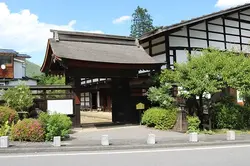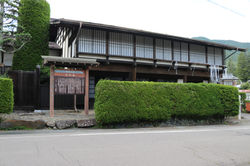top of page
中山道おしゃべりガイド
Wada-juku
Wada-juku was a lodging town established along Nakasendo in 1603. It is located 200km from Edo (now Tokyo).
In 1861, a big fire broke out and most buildings were burnt down. However, they were restored soon after. There are plenty of fascinating stories here.
On the roof of Honjin, a total of 1,633 rocks are placed. Truly amazing!

 Honjin in Wada-jukuAn inn for the VIPs during the Edo Period. This huge building features unique structures designed to safeguard the important guests. You can see numerous rocks on the roof. Designated as a National Historic Site. |  The VIPs' EntranceThe exclusive entrance for VIPs at the Honjin. Their "Kago"(palanquins) were carried directly to this spot, allowing them to proceed straight to the guest room. |  Wada-juku StreetWith inns, temples, shops, and other buildings remaining from the Edo Period, the street still has its historical atmosphere. It is designated as a National Historic Site, Nakasendo, |  KawachiyaA historical museum. It used to be an inn during the Edo Period, offering rooms ranging from simple to luxurious. Many fascinating artifacts from that time are on display. It is designated as a National Historic Site. |  The suite in KawachiyaThis elegant suite, overlooking a beautiful garden, was reserved for high-ranking or wealthy guests. Those who stayed here entered through a special gate and an exclusive entrance. |
|---|---|---|---|---|
 Shinjoji TempleA Buddhist temple built to honor the grave of the lord of Wada Castle in the 16th century. Its two-story bell tower gate is eye-catching. |
 DaikokuyaA historically significant inn from the Edo Period, which has a unique structure. |  The Stone MuseumThe museum showcases obsidian, volcanic glass that erupted from Mt.Wada about 900,000 years ago, along with obsidian artifacts from the Stone Age. Visitors can enjoy learning the history of obsidian here. |  HatanoA beautiful old house that served as the office of "Nanushi," one of the leaders of the village, during the Edo Period. Today, it offers a free travelers' lounge, rental offices and overnight rooms. |
|---|
bottom of page


